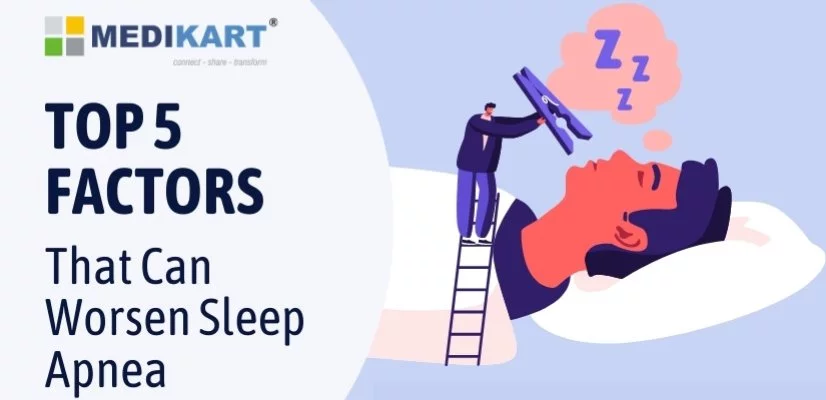If you have sleep apnea, you should seek treatment as soon as possible. Even with treatment, if you’re not careful it’s possible to make your symptoms worsen. Consider these Top 5 lifestyle variables that can aggravate sleep apnea, and begin treating them right away for better sleep and general health.
1. Weight Gain and Obesity
Your body weight is a crucial component in sleep apnea symptoms; in fact, almost 70% of OSA patients are obese.
Obesity raises the chance of obstructive sleep apnea, as well as hypertension, heart disease, and diabetes. This is because fat deposits around your neck can obstruct your upper airway when you sleep, and additional pressure on your abdomen can make breathing difficult at night. Sleep apnea can even worsen weight gain as your body manages your hormones as you sleep. Leptin, one of these hormones, aids in the regulation of your body weight and respiratory control when you sleep. If you have sleep apnea, leptin shortage can interrupt your sleep architecture and affect your upper airway resistance, as well as cause weight gain.
2. Medications
Some medications can make your sleep apnea symptoms worse by relaxing your throat muscles, which can restrict your upper airway. This can include things like:
- Muscle relaxants
- Benzodiazepines like Xanax or Valium
- Painkillers, particularly opioids
- Sleep aids
Consult your doctor if you believe your medicine is exacerbating your sleep apnea symptoms. They can help you figure out a different medication regimen or perhaps prescribe you a different medicine that won’t interfere with your sleep.
3. Sleeping Position
Sleeping on your back might aggravate sleep apnea because your tongue can slide back into your throat and block your airway. While lying on your back, any additional weight or pressure on your airway, such as body fat, can block it. Sleeping on your side is a better option.
This relieves strain on your neck and airway, allowing you to breathe more easily. Try one of these strategies to help you sleep on your side if you’re not used to it:
- Use pillows to help position yourself onto your side, or
- Position a small object such as a tennis ball or a rolled-up pair of socks on the back of your pajamas. Laying on top of them will make sleeping on your back uncomfortable, and help train you to sleep on your side.
4. Alcohol and Sleep Apnea
Alcohol relaxes muscles, including the muscles in your throat and tongue. When you drink alcohol too close to bedtime, your tongue relaxes and falls back into your airway, creating snoring or exacerbating sleep apnea symptoms.
To avoid this, don’t drink alcohol within a few hours of going to bed. This will help you breathe better by preventing your throat or tongue from being excessively relaxed.
5. Smoking and Sleep Apnea
Smoking can cause a variety of respiratory difficulties, including sleep apnea. Cigarette smoke irritates your upper airway, as well as your throat, tongue, soft palate, and other areas. The irritation might cause this area to expand over time, narrowing or blocking your airways.
Disclaimer
The information provided is for general knowledge only. Consult your doctor for personalized advice and treatment. Medikart HealthCare not liable for any actions taken based on this info.

